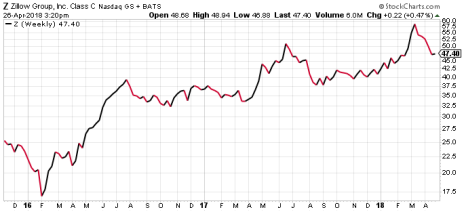Two weeks ago I kicked off this series of Forever Stocks with an introduction that explained exactly what I mean by that term.
If you missed the intro, you can skip down and read it here. If you’ve already read it, read on for today’s featured stock, the third in our series. (If you missed the first two, you can find them here and here.)
Stock #3 is…
[text_ad]
Zillow Group (Z)
(Note: these are not in alphabetical order. Instead, each week I’m highlighting the stock that’s at the best short-term buy point.)
Zillow is the world’s largest online organizer of real estate information, with data on more than 110 million homes in the U.S.
Some of these homes are for sale, some are for rent, and many are listed just for comparison. And the data is free to people like you and me!
What did we do before Zillow?
We bought newspapers, and were limited to reading the tiny print of local listings. Or we picked up free real estate magazines and perused the glossy photos.
But with Zillow, you can look at real estate anywhere in the U.S. You can drill deep, you can scan broadly, and you can investigate mortgage rates—all for free!
Zillow gets its money from real estate agents, who have found over the past decade that if they don’t pay Zillow to get their homes shown to house-hunters, they miss out on a lot of valuable leads. And the business, now 14 years old, is still growing fast.
In 2015, Zillow acquired its biggest rival, Trulia, and revenues grew 98% to $645 million. In 2016, they shot ahead another 31% to $847 million. And in 2017 they grew 27%, to $1.08 billion. So growth is not a problem here.
As for earnings, growth has been less consistent, because of investments. But analysts’ consensus is that earnings will grow 62% in 2018 and 38% in 2019. So growth is fast and the runway ahead is very long.
But that doesn’t mean Zillow is complacent! In fact, last May Zillow introduced a pilot service named Instant Offers in Las Vegas and Orlando. Using Instant Offers, a homeowner looking to sell could get all-cash offers from a hand-selected group of large private investors.
After receiving the offer(s), the homeowner had three choices.
- Accept an offer and sell directly to an investor
- Accept an offer and use an agent to manage and close the transaction
- Reject the offers and list the property on the MLS with an agent.
The results of the first year of testing showed that the vast majority of sellers wound up selling their home with an agent, making Instant Offers an excellent source of seller leads for Premier Agents and brokerage partners.
So earlier this month, Zillow announced not only that it was expanding the program to the Phoenix area, but also that Zillow would join in as a potential buyer (and seller) of homes.
But investors didn’t like it—which has created a buying opportunity!
BUYING OPPORTUNITY
Zillow came public at 20 in July 2011, and topped 60 in its first week. But six months later it was back down to 21.
In the three years that followed, the stock trended generally higher (sometimes with high volatility), peaking at 57 in July 2014 on news of the possible Trulia merger. But the year that followed wasn’t kind to Zillow, as the stock dipped all the way to 16 in early 2016.
Since then, however, the stock has been trending generally higher, working at getting back to that old high of 57. And it did succeed—for about a week—this March. But then the weight of the market correction pulled it down to the low 50s—and the announcement that Zillow was getting into the home buying and selling business brought it down to the high 40s.
As I write, the stock is 20% off its high, and 7% above its 200-day moving average, which is down around 44.50. Short-term I think it could go lower, but not much. And long-term, especially if you’re looking to treat it as a Forever Stock, I think this is a fine entry point.
Note: Mike Cintolo originally recommended Z in Cabot Top Ten Trader, and if you’d like to get his summaries of ten hot stocks delivered to your inbox every Monday, you can learn more here.
Why Invest in Forever Stocks?
Of all the ways to make money as an investor, perhaps the most rewarding is buying a stock when it is young and then holding that stock for a very long time, while it grows, and grows, and grows, bringing you profits topping 100%, 500%, even 1,000%.
Most experienced investors can easily name stocks that they wish they still owned—stocks that have doubled many times over the years. These include not only today’s big winners like Alphabet (GOOG), Amazon (AMZN), Apple (AAPL) and Netflix (NFLX) but also stocks that were previously hot and are bigger and growing more slowly now, like Carnival (CCL), Cisco (CSCO), Disney (DIS), Home Depot (HD) and Microsoft (MSFT).
But most investors who once owned these stocks don’t own them anymore!
So why are so few investors able to hold winning stocks long-term?
Because they get nervous about short-term concerns. Because they lack conviction. And often, because they become seduced by other stocks, and sell their old winners for modest profits instead of hanging on for the bigger, longer-term payoff.
And then, years later, they often wake up and say, “I wish I’d held onto that stock.”
So, this series of ten weekly posts featuring stocks that you can buy with the intention of holding forever is designed to help you do just that.
But note this—the goal of this report is not to identify stocks that can give you a modest long-term return, like Johnson & Johnson (JNJ) and VISA (V). Those stocks are fine for conservative investors working to keep their wealth, but my goal is to identify stocks that can make you rich!
I want to identify the next Amazon.com (AMZN), the next Apple (AAPL), the next Alphabet (GOOG) and the next Tesla (NFLX).
The key attributes I look for in growth stocks are these:
- A product or service or business model that is revolutionary
- A product or service or business that serves a mass market
- A company that’s still small enough to grow rapidly
- A company that is not respected—perhaps not even known—by the majority of investors.
- Last but not least, I look for a chart that shows that other investors have begun to recognize the company’s potential as well; that tells me that my thinking is on the right track.
For the record, stock # 1 was Autohome (ATHM), the Chinese company working to be the center of all consumer-oriented automobile information in China.
Stock #2 was Axon Enterprise (AAXN), formerly known as Taser. The company still sells those stun guns, but has a great new business model based on selling body cameras and in-car cameras to police departments, collecting the resulting video and storing it in the cloud, and thus generating great recurring income.
Back to today’s stock.
[author_ad]


